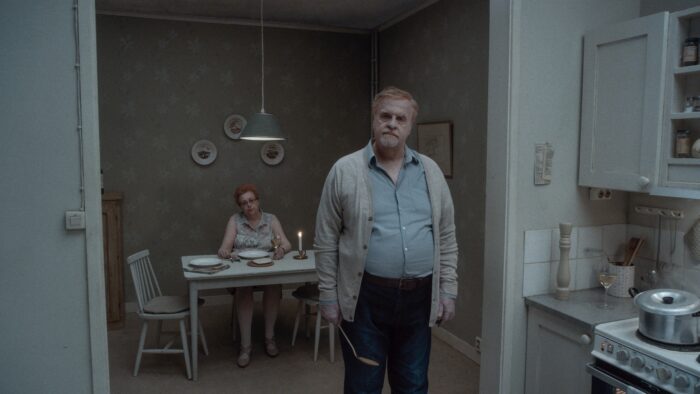VOD film review: About Endlessness
Review Overview
Beautifully constructed tableaux
9Bitty aimlessness
6Nobody does Andersson like Andersson
10Anton Bitel | On 06, Nov 2020
Director: Roy Andersson
Cast: Bengt Bergius, Anja Broms, Marie Burman, Amanda Davies, Tatiana Delaunay, Karin Engman, Jan-Eje Ferling
Certificate: 12
Watch About Endlessness online in the UK: MUBI UK / Curzon Home Cinema / Apple TV (iTunes) / Prime Video (Buy/Rent)
Despite its title, Roy Andersson’s About Endlessness (Om det oändliga) comes with the strong sense of an ending. Announced as the great Swedish mannerist director’s swan song, it sits awkwardly as the unofficial fourth part of Andersson’s loose ‘Living trilogy’. For just like his Songs From The Second Floor (2000), You, the Living (2007) and A Pigeon Sat On A Branch Reflecting On Existence (2014), Andersson’s latest (probably last) film comprises a series of drably surreal sketches, all filmed inside his Stockholm studio, all shot wide to reduce even the most craven or cruel behaviours to an absurdly pathetic scale, all using miniature models, tricks of perspective and trompe-l’oeil effects to create the impression of a huge if hermetic world, and all offering minor yet meaningful glimpses of the human condition.
If this were the first Andersson film that you had ever seen, you would marvel at its strange, fragile artifice, its elevation of the shabby and the petty, and its deft balancing of childlike wonder and jaded melancholy. Yet if you have seen his other films, it is obvious that a certain repetitiveness has settled in. Even though Andersson destroys each of his film’s sets after its scene has been shot, certain recognisable settings – a train station, a park bench overlooking the city (or at least an intricate model of the city), dreary apartment interiors, a crowded bar – appear to have been recycled, along with some of the wry half-jokes about the foibles and vulnerabilities of our species.
These repetitions might be regarded as virtue rather than flaw. Again, the clue is in the title. If Andersson’s trilogy has come to an end, then this is Andersson’s way of showing that there is no real end, only infinite reconfiguration and reconstitution, ad infinitum. The principle is laid out bluntly in one sequence, as a diffident young man describes to his bored-looking girlfriend the first law of thermodynamics: “Everything is energy, and it can never be destroyed. It is endless, it can only change from one form to another.” Likewise Andersson takes thematic motifs and visual cues made familiar by his whole life’s work, and reorganises them in a series of minor variations – and several (although certainly not all) of these new tableaux vivants also express the endlessness of the title by lacking the kind of punchline that typically rounds off Andersson’s episodes. This is, wilfully, Andersson’s most incomplete work.
There are some innovations here. The one that stands out the most is the invisible presence of a female narrator, commenting on what is occurring on screen. Her every utterance begins “I saw…” – for she, like us, is an aloof viewer, observing whatever unfolds. Sometimes what she says is purely descriptive, and merely matches what we can see for ourselves – and at other times, she offers shy forecasting of what will happen next, or even bizarre insight into things that we cannot ourselves see. For example, in one early sequence showing a woman looking out the window of her high-rise office, the narrator says, “I saw a woman, a communications manager, incapable of feeling shame.” Nothing in the sequence, apart form the words of the voiceover, is suggestive of deeds that might arouse shame, and so we are left to wonder whether this storyteller might be an all-seeing, omniscient goddess, or perhaps imaginatively supplementing, as we all do, the ellipses and empty spaces of Andersson’s free-floating vignettes.
Andersson is often, rightly, called a humanist filmmaker, but his humanism tends to focus on our more negative feelings and failings. About Endlessness is populated with a faithless priest, a late middle-aged man still dwelling on a schoolyard rivalry, defeated soldiers, a man weeping on a bus, a disgruntled dentist, a conflicted cuckold, a lost suitor, a regretful killer, and even Hitler in his bunker, confronted with the crumbling devastation of his wicked ambition. Yet there are grace notes here too: the love and devotion of a father tying his daughter’s shoelaces in the pouring rain; the pure joy of young women dancing outside a country pub. One surreal sequence shows not just a city’s war-torn ruins, but a young couple flying over it in an aerial embrace. This is love and death, entwined in a strange, and strangely affecting, rhyme – and indeed the whole film is a sort of poetic anthology, showcasing the best and worst of humanity in cursive cross-section.
About Endlessness is, at just 78 minutes, disarmingly short in duration, and itself ends with such understated bathos, lacking even the barest hint of summary closure, that you barely even notice that it is over until you see the final credits scrolling down the screen. For its last scene shows a man whose car had broken down on an isolated country road that seems to stretch infinitely into the distance. And so this film does not so much end as merely stop, leaving us marooned at an arbitrary here and now on our journey through eternity – all of which somehow seems entirely appropriate for a work about endlessness. Similarly appropriate are the inevitable rumours circulating that, having now completed his final film, Andersson is already working on a follow-up.
About Endlessness is now available on MUBI UK, as part of a £9.99 monthly subscription.



















